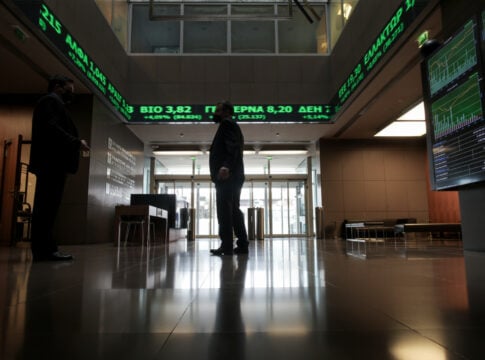“2024 and 2025 will be years with much more important investments from the Recovery Fund,” Economy and Finance Minister Kostis Hatzidakis said to “Naftemporiki” and Michalis Psilos.
“I am absolutely optimistic that – as long as we continue with a pro-investment policy – we will also achieve our target for the revenues from privatizations in 2024”, Hatzidakis noted. At the same time, he stressed the need “to send a message of political stability in the European elections, as it will also be positive for the economy.”
Regarding the increase in the minimum wage, the Minister of National Economy and Finance described it as a “difficult decision” because, as he said, “there must be a balance between the increased needs of workers who are paid the minimum wage and the capabilities of businesses. If you go beyond the capacity of the businesses, they will risk closing.”
Asked about the reactions of the main opposition, Hatzidakis noted that “under SYRIZA we were at the bottom of the list in terms of real per capita income growth, while under New Democracy we are at the top.”
The Minister of National Economy and Finance also referred to the government’s measures to deal with price spike and cutting down on tax evasion, but also the latest Moody’s rating, stressing that a new upgrade was not expected so quickly.
Asked whether a new extension will be given to the interconnection of cash registers and POS, he emphasized that “we will assess the results based on the detailed data. It seems, however, that this program has developed completely satisfactorily.”
Hatzidakis also made it clear that he will proceed with the mandatory connection of all businesses with direct payment systems such as IRIS by the end of the year.
The full interview of the Minister of National Economy and Finance, Kostis Hatzidakis to “Naftemporiki” and Michalis Psilos follows:
The minimum wage was 650 euros when New Democracy won the elections in 2019 and now it has risen to 830 euros, which is undoubtedly a significant increase. However, the purchasing power of workers who are paid the minimum wage, even after this increase, remains low. What is your comment on that?
The decision to increase the minimum wage is by definition a difficult decision. Because one has to balance between the increased needs of workers who are paid the minimum wage and the endurance of businesses. If you go beyond the capacity of businesses, they will risk closing. From 2019 to 2024 the minimum wage has increased 11.5 points above the corresponding inflation. This is a clear benefit to workers, without affecting the balance of the economy, as unemployment continues to fall. Among the 22 EU countries that have a minimum wage, Greece is in 11th place in relation to the nominal value of the minimum wage and in 13th place considering its purchasing power.
However, the main opposition SYRIZA speaks of a “sad reality” following Eurostat’s data on GDP per capita. What is your comment?
Well, have we just discovered in Greece the unfavorable consequences of the ten-year crisis we experienced? When we were all talking about losing 25% of the GDP, how could all this not have consequences? I am even more impressed that SYRIZA is surprised. They received a GDP per capita to 72% of the EU average and they dropped it to 66%. Under the SYRIZA government, we were at the bottom of the list in real per capita income growth, while under New Democracy we are at the top. The fact that we have five times the growth rate of the Eurozone average is a basic condition for real convergence.
According to public opinion surveys, the majority of citizens are concerned about high prices. Could it be that the so-called “greedflation” does not allow prices to de-escalate?
Inflation has been an international phenomenon over the last years, but both in the rest of Europe and in Greece it seems to be a de-escalating phenomenon. Take for example electricity: where it was and where it is now. Also, how prices have evolved in the last quarter thanks to competition and transparency. Regarding food, new measures have been activated, such as the so-called “clean” prices in supermarkets. I also remind you of the strict fines imposed. Moreover, it is the increase in the minimum wage as well as salary increases for civil servants after 13 years . All measures, however, must always be aligned with the strength of the economy for the private sector and the budget for the public sector. We exhaust all possibilities, adopting the best European practices.
The Greek economy was, is and will be a positive surprise for Europe, as the prime minister has repeatedly said. In fact, the vice-president of the ECB, Luis de Guindos, shared the same view in a recent interview to “Naftemporiki”, essentially describing Greece as a champion in Europe.
Europe as a whole moves in both 2023 and 2024 with very low growth rates. Although we have much better dynamics in Greece, it has been affected. However, the positive momentum that has developed over the last four and a half years has helped as well as the political stability that has been added as a positive factor after the 2023 elections for markets and investors, but also the estimate that 2024 and 2025 will be years with significant investments from the Recovery Fund. Sending a message of political stability in the European elections will also be positive for the economy.
How much can the intense uncertainties in the European and international environment affect the course of the Greek economy? For instance, we see oil rising again, with 95 octane unleaded fuel approaching 2 euros again.
The international environment always affects the country. Greece is not closed in some protective glass. We were affected both by the coronavirus crisis which led the economy in 2020 to a significant recession, and by the international energy crisis and inflationary pressures. We showed some kind of resilience, however, and that is why we had a significant increase in Foreign Direct Investment, exports and growth. No country can unilaterally influence the international development of oil and gasoline prices. However, we have taken a series of measures against profiteering and fuel smuggling. And we are responding to international economic pressures with reforms: 11 different initiatives to curb tax evasion, a new bill for greater added value of public investments, a bill to stimulate mergers and innovation and utilization of public property.
Speaking about the utilization of Public Property, you predict record revenues from privatizations. Are you optimistic that you will reach your targets for the disinvestment of the HFSF from National Bank and Attica Bank, but also the targets for total revenues of 5.7 billion euros in 2024 from privatizations?
Within just 9 months since the last elections, 10 privatizations and concession contracts have been implemented or implemented through HRADF and the HFSF with revenues of over 7.1 billion euros. For example, the sale of Helleniq Energy shares, the concession of regional ports of Igoumenitsa, Kavala and Heraklion. The listing of the Eleftherios Venizelos on the Athens Stock Exchange. The divestment from Eurobank, Alpha Bank, National Bank and Piraeus Bank. The concession of the Attica Road. In all these cases we achieved our goals. I am, therefore, absolutely optimistic that – as long as we continue with a pro-investment policy – we will also achieve our target for the revenues from privatizations in 2024.
However, Moody’s did not upgrade the prospects of the Greek economy. You said that you were not surprised by the decision? Why;
Moody’s gave us a double upgrade just 6 months ago. Therefore, a new upgrade was not expected so soon. However, Moody’s report confirms the significant progress achieved in seven areas and added that a condition for the next upgrade will be the continuation of the economic policy we are already implementing. The best confirmation of what I am telling you, however, came a few days later when we went to the markets to borrow and we achieved very positive terms. This proves that markets do not pay attention to domestic reports based on insufficient knowledge of the subject. But to the real state of the Greek economy.
What are you thinking of doing with the commission charges imposed by the banks? Will you address the issue legislatively?
Lately we have been in discussions with banks and providers about POS transaction fees. Already one of these companies has announced a reduction in commissions and I think that in the next period others will also proceed. But we don’t stay there. At the same time, we encourage the use of IRIS direct payments which allows transactions up to 500 euros with zero commissions for customers and 50% lower commissions for businesses. I have also underlined that it is our decision to proceed with the mandatory connection of all regardless of business to direct payment systems such as IRIS by the end of the year. This enhances competition and is a win-win.
And one last question. How is the interconnection of cash registers and POS going? Is there any chance of a new extension?
We had given a deadline until yesterday for the interconnection of POS and cash registers, and for those who would not make it in time, we had asked them to make an official appointment with their technicians by the end of April, informing the Independent Authority for Public Revenue (AADE) about this. Based on the data we collected until Friday night, it appears that we have a very high number of both completed connections and officially announced appointments in April. We will assess the exact results based on the detailed data today. It seems, however, that this program has developed completely satisfactorily. Another reform has been completed.














